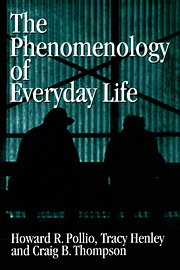Book contents
- Frontmatter
- Contents
- Preface
- PART I EXISTENTIAL PHENOMENOLOGY AND THE SCIENCE OF PSYCHOLOGY
- 1 The Nature of Human Experience
- 2 Dialogue as Method: The Phenomenological Interview
- PART II GROUNDING THE WORLD OF EVERYDAY LIFE
- PART III SELECTED TOPICS FROM EVERYDAY LIFE
- PART IV THE PHENOMENOLOGY OF EVERYDAY LIFE
- References
- Name Index
- Subject Index
2 - Dialogue as Method: The Phenomenological Interview
Published online by Cambridge University Press: 04 August 2010
- Frontmatter
- Contents
- Preface
- PART I EXISTENTIAL PHENOMENOLOGY AND THE SCIENCE OF PSYCHOLOGY
- 1 The Nature of Human Experience
- 2 Dialogue as Method: The Phenomenological Interview
- PART II GROUNDING THE WORLD OF EVERYDAY LIFE
- PART III SELECTED TOPICS FROM EVERYDAY LIFE
- PART IV THE PHENOMENOLOGY OF EVERYDAY LIFE
- References
- Name Index
- Subject Index
Summary
Research begins with a question: In the present case, how can we describe everyday human experience in ways that will be comprehensible, if not necessarily acceptable, to empirically minded social scientists? To accomplish the task of describing what other people are aware of requires a method that accepts, from the very beginning, the perspectival nature of human experience and the fact that different people may be talking about similar experiences when using different words and different experiences when using similar words. The combination of these two concerns yields a determinate method – the phenomenological interview – as an almost inevitable procedure for attaining a rigorous and significant description of the world of everyday human experience as it is lived and described by specific individuals in specific circumstances.
All too often, the use of any method, dialogue included, proscribes in advance what is to be studied and how it is to be studied. There is, however, a different and more positive sense in which method and topic come together, where both mutually select one another. If method and phenomenon arise from common concerns – how the world of everyday human experience is to be described – we have a situation appropriate to the original meaning of the word method, a meaning that combines the word hodos, a path or way, with the word meta, across or beyond. Under this rendering, method is not an algorithmic procedure to be followed mechanically if useful results are to be achieved; rather, method is a way or path toward understanding that is as sensitive to its phenomenon as to its own orderly and self-correcting aspects.
- Type
- Chapter
- Information
- The Phenomenology of Everyday LifeEmpirical Investigations of Human Experience, pp. 28 - 56Publisher: Cambridge University PressPrint publication year: 1997
- 2
- Cited by



